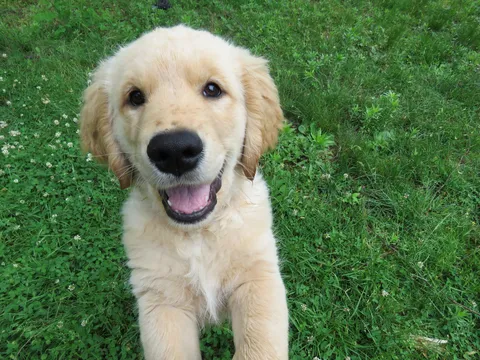Welcoming a new puppy into your home is an exciting time filled with many “firsts.” From their initial vet visits and park explorations to their first grooming sessions, you’re eager to provide the best for your furry companion. One common question that arises is about dental treats, like Dentastix, and when they are appropriate for young pups. Offering dental chews can be a rewarding bonding experience while also laying the foundation for excellent oral hygiene. But when is the right time to introduce them? This guide will delve into when you can safely give your puppy dental treats and the benefits they can offer.
 A playful puppy with a bright expression
A playful puppy with a bright expression
When Can Puppies Safely Enjoy Dental Treats?
It is generally recommended to wait until your puppy is approximately six months old before introducing dental treats. There are several crucial reasons for this waiting period:
- Developing Digestive System: Puppies are still growing and their gastrointestinal tracts are very sensitive. Introducing new foods or treats too early can sometimes lead to digestive upset and “accidents” in the house. Allowing their system to mature reduces the risk of these issues.
- Baby Teeth vs. Adult Teeth: While puppy teeth are sharp, they are still considered “baby teeth” and are not fully developed. Their jaw structure is also still forming. It’s best to wait until their adult teeth have erupted and their jaw has had time to develop properly. Giving dental treats too soon could potentially damage their delicate developing teeth.
For these reasons, many veterinary professionals and dental chew manufacturers, such as GREENIES™, suggest waiting until your puppy is around six months old. This age can vary slightly depending on your dog’s breed and expected adult size. Always consult with your veterinarian for personalized advice tailored to your individual puppy.
 Two adorable puppies playing outdoors
Two adorable puppies playing outdoors
It’s also important to remember that when you do start introducing dental treats, they should be specifically formulated for puppies.
The Importance of Puppy-Specific Dental Treats
Just as you wouldn’t feed an adult dog the same diet as a young puppy, it’s essential to choose treats designed for their specific developmental stage. Puppies have growing mouths and require a balanced intake of nutrients to support healthy growth and development.
GREENIES™ Puppy 6 Months+ TEENIE™ Dental Treats are formulated with a softer texture suitable for developing mouths. They also contain essential nutrients like DHA, which supports brain development, and calcium, crucial for building strong teeth and healthy jaws. Using treats designed for puppies ensures they are getting the right nutritional support while also benefiting from the dental cleaning action.
 A proud owner holding their happy puppy
A proud owner holding their happy puppy
The Benefits of Dental Treats for Puppies
Beyond their appeal as a tasty reward, puppy dental treats offer several advantages:
- Positive Reinforcement in Training: Dental treats can be a highly effective tool for training your puppy. They serve as a desirable reward, helping to reinforce good behavior and build positive associations. When used as part of a training regimen, it’s generally recommended to offer just one dental treat per day. Remember that praise and gentle ear scratches are also powerful, calorie-free motivators that should be used frequently during training sessions.
- Encouraging Lifelong Healthy Habits: When incorporated into a daily routine, puppy dental treats like GREENIES™ Puppy 6 Months+ TEENIE™ Dental Treats can help gently clean your puppy’s teeth and gums. This can contribute to fresher breath, often referred to as “puppy breath.” Establishing an oral care routine early on, which includes daily brushing, regular veterinary check-ups, and the introduction of dental treats, can significantly contribute to maintaining healthy teeth and gums as your puppy matures into an adult dog. As your energetic puppy grows into a mature adult, be sure to continue their dental care with appropriate GREENIES™ Dental Treats tailored to their adult size and needs.
